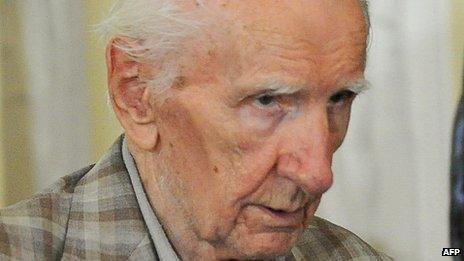Nazi war crimes suspect Laszlo Csatary dies
- Published

Laszlo Csatary denied the allegations against him
A 98-year-old Hungarian Nazi war crimes suspect, Laszlo Csatary, has died while awaiting trial, his lawyer has said.
Csatary died in hospital in Hungary after suffering from a number of medical problems, said Gabor Horvath.
He at one time topped the list of most wanted Nazi war crimes suspects and is alleged to have helped deport 15,700 Jews to death camps in World War II.
He faced charges relating to his wartime activities in both Hungary and in neighbouring Slovakia.
Mr Horvath said his client died on Saturday morning. "He had been treated for medical issues for some time but contracted pneumonia, from which he died."
Csatary had denied the allegations against him, saying he was merely an intermediary between Hungarian and German officials and was not involved in war crimes.
Art dealer
He was charged in June by Hungarian prosecutors in relation to what they said had been his role as chief of an internment camp for Jews in Kosice, a town then part of Hungary but now in Slovakia.
Kosice, known at the time as Kassa, was the first camp to be established after Germany occupied Hungary in March 1944.
Prosecutors said in a statement that Csatary, a Hungarian police officer at the time, had "deliberately provided help to the unlawful executions and torture committed against Jews deported to concentration camps... from Kosice".
He was accused of regularly beating prisoners with his bare hands and a dog whip.
Csatary, whose full name is Laszlo Csizsik-Csatary, was sentenced to death in his absence in Czechoslovakia in 1948 for war crimes.
Slovakia was seeking his extradition from Hungary so it could formally sentence him although, with the abolition of the death penalty, it intended to imprison him.
The legal proceedings in Hungary were halted last month on the grounds of double jeopardy.
Csatary was named in 2012 by the Nazi-hunting Simon Wiesenthal Center , externalas its most wanted suspect. It claimed he oversaw the deportations of Jews from Kosice to the Auschwitz death camp.
He was tracked down in Budapest in July 2012 by reporters from the UK's Sun newspaper, with help from the Simon Wiesenthal Center, and was put under house arrest.
He had fled to Canada after the war, where he worked as an art dealer in Montreal and Toronto, and disappeared in 1997 after being stripped of his Canadian citizenship.
The US-based Simon Wiesenthal Center said it was "deeply disappointed" by the news of his death.
"It is a shame that Csatary, a convicted... and totally unrepentant Holocaust perpetrator who was finally indicted in his homeland for his crimes, ultimately eluded justice and punishment at the very last minute,'' Efraim Zuroff, the centre's director, said in a statement.
The Simon Wiesenthal Center last month launched its Operation Last Chance II project, external, offering rewards for information that could help it track down the last surviving Nazi war criminals and bring them to justice.
Among its most wanted is Alois Brunner, a key operative of Adolf Eichmann, who was last seen in Syria in 2001, and Aribert Heim, a doctor at three concentration camps, who disappeared in 1962 and was last seen in Egypt in 1992.
- Published18 June 2013
- Published17 July 2012
- Published27 May 2011